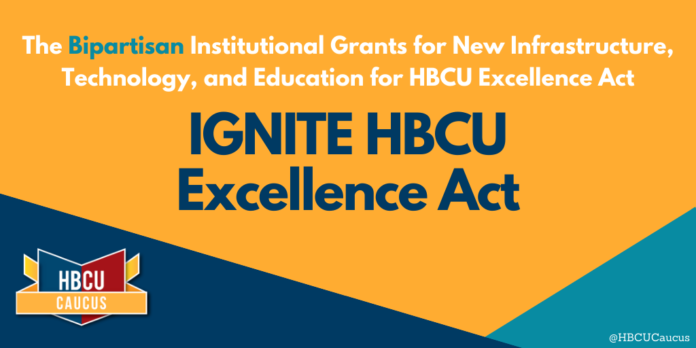
WASHINGTON, D.C – Today, Congresswoman Alma Adams (D-NC), Senator Chris Coons (D-DE), and Representative French Hill (R-AR) announced a significant milestone for the bipartisan IGNITE HBCU Excellence Act. Over 100 members of the United States House of Representatives have endorsed the legislation.
“America is ready to invest in our historically Black colleges and universities,” said Congresswoman Adams, founder and co-chair of the HBCU Caucus. “Republicans and Democrats; Senators and Congresswomen; non-profit organizations and Fortune 500 companies; all of them are coming together to show their support for the IGNITE HBCU Excellence Act. HBCU supporters know that while our institutions face unique challenges due to decades of underfunding and neglect, these colleges and universities produce some of the best returns on investment in higher education. It is time for the IGNITE Act to receive a vote as either an amendment or a stand-alone bill, and we implore our Congressional leadership to give Democrats and Republicans alike a chance to show our strong support for HBCUs!”
“HBCUs play a critical role in producing top talent, propelling upward social mobility for graduates, and in strengthening our communities,” Sen. Coons said. “Now more than ever, passing this legislation is a powerful investment in the vitality of these institutions, and I’m glad to see more colleagues on both sides of the aisle committing their support.”
“I see the powerful impact that Historically Black Colleges and Universities have on their students, community and local economy directly in Arkansas which is home to four HBCUs,” said Rep. French Hill. “Congress has shown that it can come together in a bipartisan and bicameral good faith way to ensure that HBCUs have a bright future ahead of them. It is time for Congress to pass this bipartisan bill.”
The bipartisan list of House cosponsors includes Representatives Alma S. Adams, Ph.D., French Hill, Terri Sewell, Michael Turner, Colin Allred, Jake Auchincloss, Karen Bass, Joyce Beatty, Sanford D. Bishop, Jr., Lisa Blunt Rochester, Suzanne Bonamici, Jamaal Bowman, Brendan F. Boyle, Anthony G. Brown, Cori Bush, Cheri Bustos, G. K. Butterfield, Andre’ Carson, Troy Carter, David N. Cicilline, Katherine Clark, Yvette D. Clarke, Emanuel Cleaver, II, James E. Clyburn, Steve Cohen, Jim Cooper, Joe Courtney, Charlie Crist, Danny K. Davis, Antonio Delgado, Val Demings, Lloyd Doggett, Adriano Espaillat, Dwight Evans, Brian Fitzpatrick, Sylvia R. Garcia, Al Green, Jahana Hayes, Steven Horsford, Chrissy Houlahan, Sheila Jackson Lee, Hakeem Jeffries, Eddie Bernice Johnson, Henry C. “Hank” Johnson, Jr., Mondaire Jones, Robin Kelly, Ro Khanna, Andy Kim, Raja Krishnamoorthi, Brenda L. Lawrence, Al Lawson, Barbara Lee, Blaine Luetkemeyer, Carolyn B. Maloney, Sean Patrick Maloney, Kathy Manning, Lucy McBath, Betty McCollum, A. Donald McEachin, Gregory W. Meeks, Kweisi Mfume, Gwen S. Moore, Seth Moulton, Frank Mrvan, Joe Neguse, Donald Norcross, Eleanor Holmes Norton, Ilhan Omar, Donald M. Payne, Jr., Stacey E. Plaskett, Ayanna Pressley, David Price, Amata Radewagen, Mike Rogers, Deborah Ross, Bobby L. Rush, Michael F.Q. San Nicolas, Mary Gay Scanlon, David Scott, Adam Smith, Mikie Sherrill, Abigail Spanberger, Haley Stevens, Marilyn Strickland, Eric Swalwell, Mark Takano, Bennie G. Thompson, Rashida Tlaib, Ritchie Torres, David Trone, Lauren Underwood, Marc Veasey, Nydia Velazquez, Debbie Wasserman Schultz, Maxine Waters, Bonnie Watson Coleman, Nikema Williams, Frederica Wilson, Rob Wittman, and John Yarmuth.
The bipartisan list of Senate cosponsors includes Senators Chris Coons, Tim Scott, Raphael Warnock, John Boozman, Chris Van Hollen, Thom Tillis, Cory Booker, Lindsey Graham, Bob Casey, and Cindy Hyde-Smith.
Additionally, the IGNITE HBCU Excellence Act has many endorsing organizations. Endorsing organizations include the United Negro College Fund (UNCF), Thurgood Marshall College Fund (TMCF), National Association for Equal Opportunity in Higher Education (NAFEO), IBM, Mastercard, Farm Credit, NC Electric Cooperatives, SAP, Dell, Wells Fargo, Visa, TIAA, Micron Technology, Diageo, HP Inc., Hewlett Packard Enterprise, Information Technology Industry Council, Capital One, Adobe, Autodesk, Nielsen, Oracle Corporation, Siemens, Softbank Group, Vanguard, Alaska Airlines, Truist Financial, ACT Inc., and NRCCUA.
While only representing roughly 3 percent of all four-year colleges and universities, HBCUs produce upwards of 17 percent of all bachelor’s degrees awarded to African Americans. Additionally, HBCUs enroll a disproportionately high percentage of first generation and low-income students, nearly 60 percent, and outperform their peers in supporting and graduating these students.
The incredible success of HBCUs has been achieved despite over a century of systemic underfunding at both the state and federal levels. Too often, HBCUs are forced to navigate the effects of chronic underfunding while also lacking access to alternate sources of capital available to other institutions.
The IGNITE HBCU Excellence Act invests in infrastructure at Historically Black Colleges and Universities. This legislation recognizes the contributions of these institutions in the most important way possible: by affording them the support and investment needed to deepen their transformational work. Specifically, it would authorize funds to:
- Utilize public and private investments to renovate, repair, modernize, or construct new campus facilities, including instructional, research, and residential spaces;
- Provide access to campus-wide, reliable high-speed broadband to support digital learning and long-term technological capacity;
- Develop campus facilities to support community-based partnerships that provide students and community members with academic, health, and social services;
- Procure equipment and technology needed to facilitate high-quality research and instruction;
- Preserve buildings with historic significance; and
- Ensure the resilience, safety, and sustainability of campus facilities.
# # #








